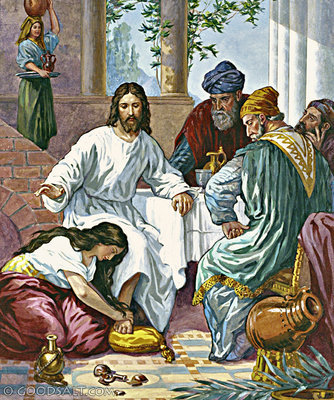11th Sunday in Ordinary Time
Your faith has saved you; go in peace. (Luke 7:50)
Ignoring the gasps that must have been uttered by the guests, the woman burst into Simon’s house and made her way toward Jesus. His earlier acts of kindness had stirred her heart and filled her with courage. A seed of faith was growing in her, and she was compelled to worship him because of the love she was beginning to experience.
Surely the guests were disgusted. Didn’t Jesus know who this woman was? She didn’t deserve to speak to him, let alone touch him. Sensing their discomfort, Jesus told Simon a story about two men who owed money to a moneylender. In a sweeping move of undeserved kindness, the moneylender forgave their debts completely. Perhaps all the guests felt that their observance of the Law had earned them the right to be with Jesus. And here was Jesus, commending this woman for her faith! What kind of faith did she have? Weren’t they better than her?
Simon’s guests seemed to have had a different understanding of faith. For them, it had something to do with their religious standing or their outward appearance. None of them was caught up in obvious sin, after all. But the faith Jesus saw in this “sinful” woman was different. He saw an open heart and a willingness to change her ways. He saw a heart that was pierced with love. And for that, heaven’s doors were opened to her.
What a generous God we have! He always welcomes us. He is always ready to forgive us, to deliver us, and to teach us. He hears our every cry for help, and it delights him when we run to him. Today, let’s all take on the faith that this woman had by simply turning to Jesus and telling him that we want to be with him. He will take care of the rest.
“Thank you, Jesus, for the seed of faith that you have given me. I come to you today, with all my sins and failings, and lay them at your feet. I know you can heal me and save me!”
2 Samuel 12:7-10, 13; Psalm 32:1-2, 5, 7, 11; Galatians 2:16, 19-21
Questions for Reflection or Group Discussion
1. In today’s first reading, Nathan reveals to David the consequences of his murder of Uriah. Why do you think David is still called a “man after God’s heart” (1 Samuel 13:14, Acts 13:22), in spite of this horrible sin?
2. The responsorial psalm speaks of the fruit of repentance in the psalmist’s life: “I confess my faults to the Lord, and you took away the guilt of my sin.” How would you describe the fruits of repentance and the Sacrament of Reconciliation in your life?
3. In the second reading, Paul says that he has been “crucified with Christ.” What do you think this mean? In what ways have you been “crucified with Christ”?
4. In the Gospel, the woman with the alabaster jar performs a great deed out of love for Jesus. Then Jesus proclaims these amazing words, “So I tell you her many sins have been forgiven, because she has shown great love. But the one to whom little is forgiven, loves little.” What do these words mean to you, and how do they apply to your life?
5. The meditation ends with these words. “What a generous God we have! He always welcomes us. He is always ready to forgive us, to deliver us, and to teach us. He hears our every cry for help, and it delights him when we run to him. Today, let’s all take on the faith that this woman had by simply turning to Jesus and telling him that we want to be with him. He will take care of the rest.” What steps can you take to draw closer to the Lord and experience more deeply his love, healing, deliverance, and forgiveness? What steps can you take to give what you have received from the Lord to others?
6. Take some time now to pray and ask the Lord to deepen your faith in him and in his great mercy, as you give him all your burdens. Use the prayer at the end of the meditation as a starting point.

